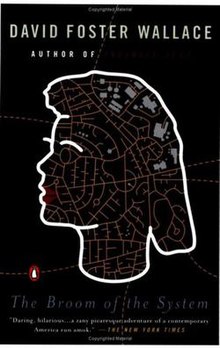|
The Broom of the System
The Broom of the System is the first novel by the American writer David Foster Wallace, published in 1987. BackgroundWallace submitted the novel as one of two undergraduate honors theses at Amherst College, the other being a paper on Richard Taylor's fatalism. He had begun study in philosophy at Amherst, interested in math and logic, and developed an interest in Ludwig Wittgenstein before beginning the novel. A professor commented that Wallace's philosophy writing tended to have the quality of an unfolding story, leading Wallace to explore literature. Having submitted Broom of the System to the Department of English, he decided to focus his career on fiction. Broom was published in 1987 as Wallace completed a Master of Fine Arts in creative writing at the University of Arizona. He had also sold his first short-story collection Girl with Curious Hair. Wallace stated that the initial idea for the novel sprang from a remark made by an old girlfriend. DT Max reported that, according to Wallace, she said "she would rather be a character in a piece of fiction than a real person. I got to wondering just what the difference was."[1] Wallace revealed in an interview that the novel was somewhat autobiographical: "the sensitive tale of a sensitive young WASP who's just had this midlife crisis that’s moved him from coldly cerebral analytic math to a coldly cerebral take on fiction... which also shifted his existential dread from a fear that he was just a 98.6°F calculating machine to a fear that he was nothing but a linguistic construct."[1] Plot summaryThe book centers on the comparatively normal Lenore Beadsman, a 24-year-old telephone switchboard operator who gets caught in the middle of a Cleveland-based character drama. Lenore deals with three separate crises: her great-grandmother's escape from a nursing home, a neurotic boyfriend, and a suddenly vocal pet cockatiel. The controlling idea surrounding all of these crises is the use of words and symbols to define a person. To illustrate this idea, Wallace uses different formats to build the story, including transcripts from television recordings and therapy sessions, as well as an accompanying fictional account written by one of the main characters, Rick Vigorous. The manager of the nursing home, David Bloemker, repeatedly expresses himself in an overly elaborate style, only to have to reduce his own locutions to a much simpler form. For example, he tells Lenore that if they find her great-grandmother (also named Lenore), they will likely also find the other missing residents of the facility. Why? Because, she "enjoyed a status here — with the facility administration, the staff, and, through the force of her personality and her evident gifts, especially with the other residents [such that] it would not be improper to posit the location and retrieval of Lenore as near assurance of retrieving the other misplaced parties." The younger Lenore says that she doesn't understand all of that. Bloemker tries again: "Your great-grandmother was more or less the ringleader around here." This contrast of baroque with simple speech is employed to comic effect, as well as to advance the more serious contemplation of language at the heart of the plot. Major charactersMany secondary characters are not included here.
ThemesA recurring concept in The Broom of the System is psychology as relating to words; many of the theories discussed involve Ludwig Wittgenstein's ideas and principles.[1] Wallace himself stated that the book can be viewed as a dialogue between Wittgenstein and Derrida.[2] ReceptionThe publication earned Wallace the Whiting Award in 1987.[3] Caryn James of the New York Times criticized elements of the book, writing in her review:[4]
Despite these perceived short-comings, she ultimately found strength in the writing:
In the same newspaper, Michiko Kakutani wrote a somewhat unfavorable review, calling it "an unwieldy, uneven work - by turns, hilarious and stultifying, daring and derivative". Praising the author's ambition and imagination, she wrote that "the reader intermittently feels that the author wants to use Lenore's story as a Nabokovian armature on which to drape serious philosophical and literary discussions. The problem is that [...] 'The Broom of the System' is pock-marked with superfluous verbal riffs [...] repetitious digressions, and nonsensical babbling that reads like out-takes from a stoned, late-night dormitory exchange." Kakutani claimed Wallace has a "story-telling gift" but recommended more "narrative discipline and the exchange of other writers's [sic] voices for a more original vision."[5] Robert Asahina of Los Angeles Times wrote a review that parodies the style of the book itself, and wrote that "writers have abdicated responsibility for meaning to readers [...] the book essentially seems to be about itself, ‘a game consisting of involved attempts to find out the game’s own rules,’ and not about Lenore". Asahina suggested that coincidence is "an all-too-convenient plot device" in the book, and that those who were not fans of metafiction would likely find it "consistently, off-puttingly pretentious".[6] A reviewer for Kirkus Reviews argued that Wallace "is something of a puerile Pynchon, a discount Don DeLillo [...] Wallace dabbles in big ideas, with too many pseudo-Wittgensteinian pauses [...] and much callow satire on consumer/evangelical America. Despite flashes of real genius, it's a heady Animal House vision."[7] In 2011, Tori Schacht of The Rumpus praised the irony of the ending and wrote, "This is Wallace in the nascent stage of his literary powers, attempting to reconcile his interest in Wittgenstein and language with his desire to speak of something urgent and true about us and our beautiful messes."[8] References
|
||||||||||||||||||||||||||||
Portal di Ensiklopedia Dunia
